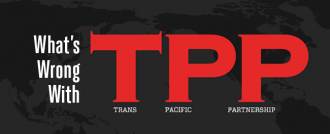The Electronic Frontier Foundation is reporting that the content industry is at it again with TPP, the Trans-Pacific Partnership agreement. In what it's calling the "biggest global threat to the Internet since ACTA," the EFF is raising alarms about the new proposed agreement that would likely "export some of the worst features of U.S. copyright law to Pacific Rim countries."
Eleven governments from around the Pacific, including the US, Australia, Peru, Malaysia, Vietnam, New Zealand, Chile, Singapore, Canada, Mexico, and Brunei Darussalam, are scheduled to meet and negotiate the TPP agreement from May 15-24 in Lima, Peru.
Perhaps what's most alarming, yet not surprising, is that these arrangements are being made entirely in secret, cutting out democracy and transparency from the process. Most of what is known about the current version of the TPP is from a leaked draft [PDF] from February 2011.
While the Trans-Pacific Partnership is a broad trade agreement, the EFF is concerned mainly with the chapters pertaining to copyright and intellectual property law. These include "a broad ban on breaking digital locks on devices and creative works (even for legal purposes), a minimum copyright term of the lifetime of the creator plus seventy years (the current international norm is the lifetime plus fifty years), privatization of enforcement for copyright infringement, ruinous statutory damages with no proof of actual harm, and government seizures of computers and equipment involved in alleged infringement."
What's worse, they say, is that this agreement would effectively preempt any participating country from introducing more balanced copyright laws in the future, locking them into policies that are potentially harmful to consumers and will inhibit their ability to create on the Web.
For a more detailed look at the provisions within the TPP consult the EFF page, and if you are as concerned by this news as we are, consider sending a message to a local representative (or go to stopthetrap.net if you are outside the US). We've also attached the infographic below for a quick visual overview of TPP.

